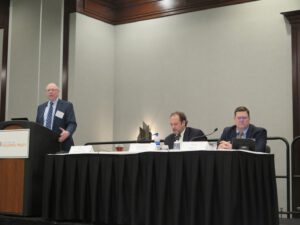North Carolina Alcohol Policy Forum Examines State-Based Alcohol Regulation, Public Health and Safety

DURHAM, NC – On Monday, Feb. 25 The Center for Alcohol Policy and the North Carolina Beer and Wine Wholesalers Association co-hosted one of the Center’s state alcohol policy forums, which enjoyed the attendance of over 50 state policymakers, legislative staff, alcohol regulators, several public health representatives, and industry members.
The forum was kicked off by the National Beer Wholesalers Association’s Chief Economist Lester Jones, who provided the audience with an evaluation of the current role that the industry plays in the U.S. economy and industry trends that are taking hold.
The second session included a panel that delved into the public health benefits that stem from proper and effective alcohol regulation. Pam Erickson, former Executive Director of the Oregon Liquor Control Commission and CEO of Public Action Management, delivered a brief history of why alcohol has been and should be regulated the way it is, pointing out that “we cannot sell alcohol like we do tires and mayonnaise.” Citing a United Kingdom case study, Erickson described how that country’s “alcohol-related problems became epidemic” after deregulation, and “once you de-regulate, it is almost impossible to go back.”
Following Erickson, Dylan Ellerbee, Chair of the North Carolina Alcohol Policy Alliance, dove deeper into the public health and safety aspects of alcohol control. Ellerbee touched on the current “public health crisis” that stems from alcohol abuse, provided recommendations on how to curtail the high consumption of alcohol, then expounded on North Carolina’s control system, in which liquor retail stores are government-owned.
“Revenue generated per capita is around $30, while for non-control states it’s around $14.” He continued that “North Carolina is 44th of all states in consumption rates and 7th in revenue generated.” Ellerbee concludes that there would be negative repercussions if the state were to do away with its current system.
The forum’s final session highlighted the legal relevance of alcohol regulation and the differences between control system states and license system states. Brannon Denning, a Center Advisor and law professor at Samford University’s Cumberland School of Law, primarily focused on the significance of Toward Liquor Control right after prohibition and still today, given that it has “provided a road map on temperance, separation of the tiers, licensing and much more.”
Denning additionally updated attendees on recent court cases that are challenging the current system, such as Tennessee Wine and Spirits Retailers Association v. Thomas.
Closing the day, Neal Insley, Senior VP and General Counsel at the National Alcohol Beverage Control Association (NABCA), offered a comprehensive look at “control states” versus “license states.” Insley maintains that while both systems involve shared principles that help curtail problems to keep an orderly alcohol market, “control states tend to have much more control over issues such as pricing and receive more accountability from the state.”
When regulating, Insley emphasizes, “we need to acknowledge that alcohol is not an ordinary product, recognize the important role of science in informing and enforcing regulation, and find a balance between public safety and commercial interests.”
The Center for Alcohol Policy regularly hosts conferences that bring together a wide range of experts in the field of alcohol law. The Center will host its 12th Annual Alcohol Law and Policy Conference August 25-27, 2019 in Boston, Mass. Each year, the event includes attorneys, alcohol regulators, academic leaders, public health advocates and other experts who discuss and debate current alcohol laws and challenges.
